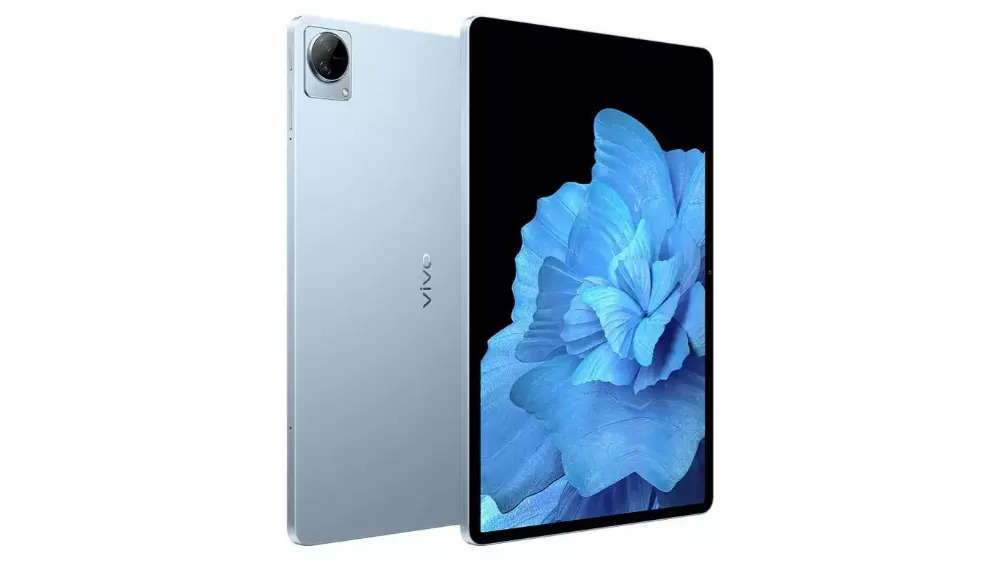The original Vivo Pad was available in the company’s domestic market in two different colour options — Blue and Black and was priced under Rs 30,000. Moreover, Vivo also introduced a stylus and keyboard with the tablet.
Vivo Pad: Key specs
Last year’s Vivo Pad sports an 11-inch WQXGA display that supports 2560×1600 pixel resolution, a 120Hz refresh rate, HDR10 and Dolby Vision. This Android tablet comes powered by Qualcomm’s octa-core Snapdragon 8 Gen 1 chipset. The tablet packs 8GB of RAM and is available in two different storage options — 128GB and 256GB. The Vivo Pad 2 is expected to ship with the latest Snapdragon 8 Gen 2 chipset.
Vivo Pad houses a dual rear camera setup that includes a 13MP primary sensor and an 8MP ultra-wide angle lens. The tablet’s rear camera setup offers 4K recording. Meanwhile, it also boasts an 8MP front camera for selfies and video calling.
The tablet also ships with a quad-speaker setup that supports Dolby Atmos. Vivo Pad also packs an 8040mAh battery unit that supports 44W fast charging. It runs on the company’s custom OriginOS HD skin based on Android 11. Apart from this, the tablet can also be attached to an external magnetic keyboard and it also comes with stylus support.
!(function(f, b, e, v, n, t, s) {
window.TimesApps = window.TimesApps || {};
const { TimesApps } = window;
TimesApps.loadFBEvents = function() {
(function(f, b, e, v, n, t, s) {
if (f.fbq) return;
n = f.fbq = function() {
n.callMethod ? n.callMethod(…arguments) : n.queue.push(arguments);
};
if (!f._fbq) f._fbq = n;
n.push = n;
n.loaded = !0;
n.version = ‘2.0’;
n.queue = [];
t = b.createElement(e);
t.async = !0;
t.defer = !0;
t.src = v;
s = b.getElementsByTagName(e)[0];
s.parentNode.insertBefore(t, s);
})(f, b, e, v, n, t, s);
fbq(‘init’, ‘593671331875494’);
fbq(‘track’, ‘PageView’);
};
})(
window,
document,
‘script’,
‘https://connect.facebook.net/en_US/fbevents.js’,
);if(typeof window !== ‘undefined’) {
window.TimesApps = window.TimesApps || {};
const { TimesApps } = window;
TimesApps.loadScriptsOnceAdsReady = () => {
var scripts = [
‘https://www.googletagmanager.com/gtag/js?id=AW-877820074’,
‘https://www.googletagmanager.com/gtag/js?id=AW-658129294’,
‘https://timesofindia.indiatimes.com/grxpushnotification_js/minify-1,version-2.cms’,
‘https://connect.facebook.net/en_US/sdk.js#version=v10.0&xfbml=true’,
‘https://timesofindia.indiatimes.com/locateservice_js/minify-1,version-14.cms’
];
scripts.forEach(function(url) {
let script = document.createElement(‘script’);
script.type=”text/javascript”;
if(!false && !false && !false && url.indexOf(‘colombia_v2’)!== -1){
script.src = url;
} else if (!false && !false && !false && url.indexOf(‘sdkloader’)!== -1) {
script.src = url;
} else if (!false && (url.indexOf(‘tvid.in/sdk’) !== -1 || url.indexOf(‘connect.facebook.net’) !== -1 || url.indexOf(‘locateservice_js’) !== -1 )) {
script.src = url;
} else if (url.indexOf(‘colombia_v2’)== -1 && url.indexOf(‘sdkloader’)== -1 && url.indexOf(‘tvid.in/sdk’)== -1 && url.indexOf(‘connect.facebook.net’) == -1){
script.src = url;
}
script.async = true;
script.defer = true;
document.body.appendChild(script);
});
}
}


)





More News
OnePlus Nord CE 4 to launch in India on April 1: Here’s what the smartphone will offer – Times of India
Xiaomi 14 series is now available in India: Sale, pre-booking and more – Times of India
Kiren Rijiju: Why Earth Sciences minister Rijiju is upset with this European IT company | – Times of India